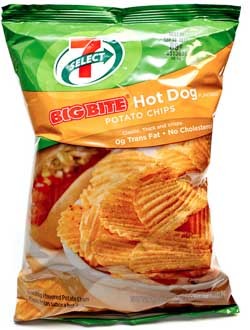Top Class Actions’s website and social media posts use affiliate links. If you make a purchase using such links, we may receive a commission, but it will not result in any additional charges to you. Please review our Affiliate Link Disclosure for more information.

The Appeals Court reversed the district court’s previous ruling that plaintiff Scott Bishop failed to allege facts sufficient to establish standing under California’s unfair competition law, and reinstated the case.
“Bishop adequately alleged that he relied on 7-Eleven’s potato chips’ front-of-package ‘0g trans fat’ and ‘no cholesterol’ representations, and that he would not have purchased the chips had 7-Eleven included on the front of the package the ‘See nutrition information for fat content’ disclosure required by the U.S. Food and Drug Administration,” the court asserted.
Additionally, the court stated that while not “technically false,” California consumer protection laws provide for reasonable standing for statements that have a tendency to mislead consumers because the statements “fail to disclose or direct the consumer’s attention to other relevant information.”
Essentially, the court determined that because the front packaging labeled the chips as containing no trans fat, any reasonable customer would assume that the nutritional information on the back labeling would also be the same.
Bishop originally filed the class action lawsuit against 7-Eleven in 2012, claiming the store-branded potato chips were falsely labeled as containing no trans fat or cholesterol. Specifically, Bishop claimed that he was misled to believe the 7-Eleven potato chips were healthier than they actually were based on the package labeling.
In April 2014, a federal judge dismissed the amended 7-Eleven potato chip class action lawsuit with prejudice on grounds that Bishop did not support claims of economic injury because he chose to purchase the product. U.S. District Court Judge Edward Davila issued the ruling stating that ““the lack of disclosure on its own is not enough to confer standing on Plaintiff to bring a claim.”
Davila also dismissed an earlier version of the consumer complaint back in August 2013, ruling that Bishop failed to specify exactly which of the fifteen named 7-Eleven products were at issue and thus was too vague.
During oral arguments back in May, Bishop’s attorney pleaded with the Ninth Circuit to revive the 7-Eleven potato chips class action lawsuit, arguing that 7-Eleven omitted the FDA-required disclaimer regarding nutrition content. By leaving off the front packaging disclosure, Bishop’s attorneys contend 7-Eleven knowingly advertised the chips as healthier than they actually are.
“Potato chips, no one expects that they’re healthy, but what you’ve got here is 7-Eleven attempting to gain market advantage by using a claim that’s a half-truth to distinguish itself from a competitor,” Bishop’s attorney stated.
However, 7-Eleven disputed the argument, requesting that the dismissal be upheld.
“The plaintiff in this case has admitted that he read the nutrition facts panel before he bought the product,” 7-Eleven attorneys argued.
Bishop is represented by Pierce Gore of Pratt & Associates and David McMullen Jr. of Barrett Law Group PA.
The 7-Eleven Potato Chips Class Action Lawsuit is Scott Bishop v. 7-Eleven Inc., Case No. 14-15986, in the U.S. Court of Appeals for the Ninth Circuit.
ATTORNEY ADVERTISING
Top Class Actions is a Proud Member of the American Bar Association
LEGAL INFORMATION IS NOT LEGAL ADVICE
Top Class Actions Legal Statement
©2008 – 2024 Top Class Actions® LLC
Various Trademarks held by their respective owners
This website is not intended for viewing or usage by European Union citizens.














